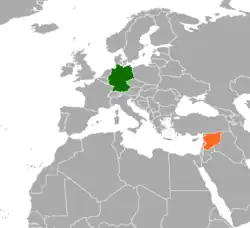 | |
Germany |
Syria |
|---|---|
Germany–Syria relations are the bilateral relations between Germany and Syria. Germany closed its Damascus embassy and stopped its recognition of Bashar al-Assad in 2012 because of the Syrian civil war, but has never completely cut relations with the Syrian government.[1]
History
In 1927, the German Empire established a consulate to represent its interests in Lebanon and Syria. In 1934, the consulate was transformed into a consulate general. During Second World War, Syria was briefly under control of the German-dependent Vichy regime, but was captured by British and anti-German French forces in 1941 in the Syria–Lebanon campaign. After the war, Syria declared independence on April 17, 1946. Former officers of the Wehrmacht were involved as advisors in building up the Syrian armed forces.[2] In 1952, diplomatic relations were established between Syria and the Federal Republic of Germany (FRG) were established. At the time of the United Arab Republic (1958-1961), Syria operated a joint embassy in Bonn with Egypt under Nasser.
After the FRG's diplomatic recognition of Israel in 1965, Syria severed diplomatic relations with the FRG. Instead, informal relations with the German Democratic Republic (GDR) were expanded, and by the mid-1960s the two countries had become close partners even before official diplomatic relations were established in 1969. The GDR provided extensive economic aid to Syria, which was ruled by the Baath Party. For example, GDR advisors helped establish a centrally-planned economy in Syria, and Syrian security forces were trained by the Ministry of State Security and their Syrian equivalents were modeled on the GDR, influencing the Syrian state into the 21st century. With the coming to power of the less socialist oriented Syrian nationalist Hafiz al-Assad in 1970, relations with the GDR were eventually scaled back, and relations with the FRG were resumed in 1974.[3]
In 2001, Syrian President Bashar al-Assad visited German Chancellor Gerhard Schröder on a state visit in Berlin. The meeting was about a peace plan for the Middle East conflict and German development aid. German Development Minister Heidemarie Wieczorek-Zeul proclaimed the motto "change through cooperation".[4] After German Reunification, Syria moved its embassy from Bonn to Berlin in 2002/03. With the start of the Civil War in Syria, the German embassy in Damascus was closed in 2012. Germany joined economic sanctions against the Assad regime and cut diplomatic contacts with the Syrian government to a minimum. In addition, several Syrian diplomats were expelled from the country, including the Syrian ambassador to Germany in May 2012 after the Massacre of Hula.[5] Unlike other Western countries such as the United States, however, diplomatic relations were not severed.[6] In the context of the crisis in Syria, Germany provided billions of dollars in humanitarian assistance and took in large numbers of Syrian refugees itself.
On December 4, 2015, the Bundestag voted to authorize the participation of the Bundeswehr in the international anti-ISIL coalition in Syria, which ended in January 2021.[7] The Berlin Prosecutor General's Office opened an investigation at the end of January 2017 into allegations that the Syrian embassy in Berlin had issued passports without verification but with an extra fee.[8] In February 2021, pro-Assad supporter Eyad A. was sentenced by a Regional Court to four and a half years in prison for war crimes committed in the Syrian civil war, marking the first international conviction for charges involving "crimes against humanity" committed by individual linked to the Government of Syria during the war.[9]
In January 2022, a German court in Koblenz sentenced Syrian officer Anwar Raslan to life imprisonment, declaring him guilty over crimes against humanity. Anwar Raslan had served as a colonel under the notorious Branch 251 of Ba'athist General Intelligence Directorate and was charged with organizing large-scale torture, rape, sexual violence against detainees and in the killing of 58 individuals.[10][11][12] In July 2023, German police basted a major captagon network in the southern state of Bavaria, run by two Syrian-born men who were involved in production and smuggling of captagon.[13]
Migration
Major migration between the countries first occurred in the 1960s as part of the close partnership between East Germany and Syria. A total of 4000 Syrian students studied in West and East Germany, and in 2009, 22 percent of professors at the University of Damascus had a German degree.[14] In 2009, there were about 30,000 Syrians living in Germany.[15] More than six million Syrians have left their homes as part of the civil war in the country. In 2021, there were approximately 868,000 people from Syria living in Germany, the vast majority of whom arrived in the country as part of the Refugee Crisis 2015/2016.[16] Well-known German-Syrians include political scientist Bassam Tibi, politician Lamya Kaddor and football player Mahmoud Dahoud.
Economic relations
Syria's economic performance plummeted with the start of the civil war in 2011, and the country was placed under sanctions by Western industrialized countries.[17] Economic relations with Germany are therefore weak. The bilateral trade volume amounted to only 60 million euros in 2021.[18]
Before the civil war, Syria was a major tourist destination due to its cultural sites and was also visited by many Germans. Since 2019, some tourists from Germany have been traveling to the country again, despite travel warnings.[19]
Humanitarian aid
Since the beginning of the Syrian civil war, Germany has provided humanitarian aid amounting to more than 10 billion euros up to 2022, making it one of the leading donor countries. The German government has worked with partners such as the United Nations World Food Programme, the Red Cross, and Save the Children.[20] The focus has been on supporting refugees in Syria and neighboring countries. Aid was also provided to stabilize regions in northern Syria that had been occupied by the Islamic State.[21]
Diplomatic missions
- Germany has an embassy in Damascus (closed since 2012).[22]
- Syria has an Embassy in Berlin.[23]
 Syrian Embassy in Berlin.
Syrian Embassy in Berlin.
See also
Further reading
- Chen, Chern (2018). "Former Nazi Officers in the Near East: German Military Advisors in Syria, 1949–56". The International History Review. 40 (4): 732–751. doi:10.1080/07075332.2017.1367705. S2CID 158837784.
- Rankin, Melinda (2019). "The 'Responsibility to Prosecute' Core International Crimes? The Case of German Universal Jurisdiction and the Syrian Government". Global Responsibility to Protect. 11 (4): 394–410. doi:10.1163/1875984X-01104003. ISSN 1875-984X. S2CID 210458363.
- Trentin, Massimiliano (2021). "State-led Development: The Privileged Linkage between East Germany and Ba'athist Syria, 1965–1972". Contemporary European History. 30 (4): 581–596. doi:10.1017/S0960777321000369. hdl:11585/852257. ISSN 0960-7773.
- Trentin, Massimiliano (2008). "'Tough negotiations'. The two Germanys in Syria and Iraq, 1963–74". Cold War History. 8 (3): 353–380. doi:10.1080/14682740802222155. S2CID 218576332.
References
- ↑ Welle (www.dw.com), Deutsche. "Germany grapples with its identity crisis on Syria | DW | 14.03.2021". DW.COM. Retrieved 16 December 2021.
- ↑ Chern Chen (2018-08-08), "Former Nazi Officers in the Near East: German Military Advisors in Syria, 1949–56", The International History Review (in German), vol. 40, no. 4, pp. 732–751, doi:10.1080/07075332.2017.1367705, ISSN 0707-5332, S2CID 158837784, retrieved 2022-10-14
- ↑ Massimiliano Trentin (November 2021), "State-led Development: The Privileged Linkage between East Germany and Ba'athist Syria, 1965–1972", Contemporary European History (in German), vol. 30, no. 4, pp. 581–596, doi:10.1017/S0960777321000369, hdl:11585/852257, ISSN 0960-7773
- ↑ "Staatsbesuch: Berlin sagt Assad Hilfe zu". Der Spiegel (in German). 2001-07-11. ISSN 2195-1349. Retrieved 2022-10-15.
- ↑ "Welle von Ausweisungen gegen Botschafter Syriens | NZZ", Neue Zürcher Zeitung (in German), retrieved 2022-10-14
- ↑ Deutsche Welle (www.dw.com). "Germany grapples with its identity crisis on Syria | DW | 14.03.2021". Deutsche Welle. Retrieved 2022-10-14.
- ↑ tagesschau.de. "Bundestag verlängert Bundeswehr-Einsatz im Irak" (in German). Retrieved 2022-10-14.
- ↑ Berliner Zeitung. "Neue Identität: Syrische Botschaft soll Pässe gegen "Extragebühr" ausgestellt haben" (in German). Retrieved 2022-10-14.
- ↑ Sabine am Orde (2021-02-26), "Urteil gegen Eyad A.: Rechtsgeschichte aus Koblenz", Die Tageszeitung: Taz (in German), ISSN 0931-9085, retrieved 2022-10-14
- ↑ Westendarp, Louis (13 January 2022). "German court convicts Syrian colonel of crimes against humanity". Politico. Archived from the original on 21 March 2023.
- ↑ Hill, Jenny (13 January 2022). "German court finds Syrian colonel guilty of crimes against humanity". BBC News. Archived from the original on 23 March 2023.
- ↑ Welle (www.dw.com), Deutsche. "Germany grapples with its identity crisis on Syria | DW | 14.03.2021". DW.COM. Retrieved 16 December 2021.
- ↑ "German police arrest Syrians in Bavaria captagon factory bust". New Arab. 20 July 2023. Archived from the original on 22 July 2023.
- ↑ Deutsche Welle (www.dw.com). "Deutsch-deutsche Spuren in Syrien | DW | 26.10.2009". Deutsche Welle (in German). Retrieved 2022-10-14.
- ↑ "Zahlen und Fakten: Syrer in Deutschland - gut integriert?". www.zdf.de (in German). Retrieved 2022-10-15.
- ↑ "Ausländer aus Syrien in Deutschland bis 2021". Statista (in German). Retrieved 2022-10-15.
- ↑ "Wiederaufbau in Syrien" (in German). Retrieved 2022-10-14.
- ↑ "Rangfolge der Handelspartner im Außenhandel" (PDF). Statistisches Bundesamt. Retrieved 2022-09-30.
- ↑ Fabian von Poser (2022-01-31), "Dark Tourism: Länder wie Irak, Südsudan oder Syrien locken Urlauber", Die Welt (in German), retrieved 2022-10-14
- ↑ Auswärtiges Amt. "Humanitäre Hilfe in Syrien bleibt lebenswichtig" (in German). Retrieved 2022-10-14.
- ↑ Auswärtiges Amt. "Zehn Jahre Konflikt in Syrien – Sieben Fragen an die deutsche Außenpolitik" (in German). Retrieved 2022-10-14.
- ↑ Auswärtiges Amt. "Deutsche Vertretungen in Syrien" (in German). Retrieved 2022-10-14.
- ↑ Auswärtiges Amt. "Syrien" (in German). Retrieved 2022-10-14.
